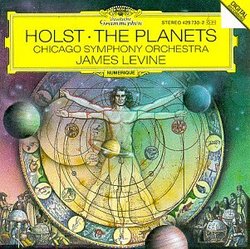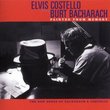| All Artists: Gustav Holst, James Levine, Chicago Symphony Orchestra & Chorus Title: Holst: The Planets Members Wishing: 0 Total Copies: 1 Label: Deutsche Grammophon Release Date: 5/10/1991 Genre: Classical Style: Number of Discs: 1 SwapaCD Credits: 1 UPC: 028942973022 |
Search - Gustav Holst, James Levine, Chicago Symphony Orchestra & Chorus :: Holst: The Planets
 | Gustav Holst, James Levine, Chicago Symphony Orchestra & Chorus Holst: The Planets Genre: Classical
![header=[] body=[This CD is available to be requested as disc only.]](/images/attributes/disc.png?v=4eeb5dd5) ![header=[] body=[This CD is available to be requested with the disc and back insert.]](/images/attributes/disc_back.png?v=4eeb5dd5) ![header=[] body=[This CD is available to be requested with the disc and front insert.]](/images/attributes/disc_front.png?v=4eeb5dd5) ![header=[] body=[This CD is available to be requested with the disc, front and back inserts.]](/images/attributes/disc_front_back.png?v=4eeb5dd5) |
Larger Image |
CD DetailsSimilar CDs
Similarly Requested CDs
|
CD ReviewsTake a mystical astral tour with Holst's The Planets Alex Diaz-Granados | Miami, FL United States | 01/23/2004 (5 out of 5 stars) "Gustav Holst's "The Planets" (Op. 32) is a seven-movement symphonic poem which describes the "personalities" of most of our celestial neighbors in the solar system. Had Pluto been discovered when Holst was composing this wonderful piece in the early 20th Century, there might have been an eighth movement (perhaps called "The Guardian of the Dead"), but the ninth planet was not discovered until 1930, 12 years after its first rehearsal. No matter. One missing planet doesn't take away from the breathtaking wonder of this very powerful composition.Holst is not literally describing each planet's physical features, for at the turn of the 20th Century there were no Voyager or Viking probes to send back images from which the composer could derive some inspiration, although I would like to think that some NASA engineer was listening to this music while driving to and from the Jet Propulsion Lab in Pasadena as one of our mechanical explorers was making its lonely sojourn across the vast and cold expanses of space. No, Holst was going for the planets as astral metaphors, giving each movement a descriptive title ("Mars, the Bringer of War," for instance) and a particular musical "mood" that is totally unconnected to the others.James Levine (best known as the Metropolitan Opera's music director) leads the magnificent Chicago Symphony Orchestra and Chorus into a mystical musical tour of the heavens, starting with the belligerent allegro "Mars, the Bringer of War." This movement starts with very tense and brooding music that becomes very martial, almost as if Holst had composed it for the score of a great silent epic depicting the then-ongoing Great War. It is a very "modern" piece, with very militaristic tempos that convey discord and strife. It even sounds like a precursor to John Williams' "The Imperial Attack" cue from his score to Star Wars: A New Hope. (If you play the last minute or so of the allegro, then listen to any recording of "The Imperial Attack," you will notice the similarity.)In sharp contrast to the first movement, Venus, the Bringer of Peace" is a gentle and reflective piece, with lush strings and restrained tones suggesting astral tranquility. My favorite movement is "Jupiter, the Bringer of Jollity," with its lively introduction and bright motifs that lead into a "hope and glory" theme which conveys grandeur and pomp, as if composed for a coronation or royal wedding. Holst uses various tempos and variations on themes, building on each musical construct until reaching a triumphal orchestral climax. (Listeners of the old WTMI 93.1 FM classical station in South Florida will recognize the opening bars of "Jupiter" as the musical intro to the news updates in the morning and afternoon.)Levine and the Chicago Symphony and Chorus perform this multifaceted work brilliantly in this 1990 Deutsche Gramophon recording, and Holst's magnificent mix of orchestral moods takes the listener on an aural equivalent of a Grand Tour of the heavens." Excellent performance - minor complaint W. Crone | Northern CA USA | 12/06/2006 (5 out of 5 stars) "The Planets suite is quite a thing of beauty. This recording made by the Chicago Symphony Orchestra, under the direction of James Levine, is quite good. The powerful, brassy sound other reviewers have spoke of is obvious here and it works perfectly. My only gripe is not really a bad thing. The dynamic range on this disc is tremendous. I often am forced to listen to music at levels which won't get me evicted from my apartment. In doing so, I have found that the piano or pianissimo (or pianississimo) passages are inaudible. It still sounds superb; I just have to crank it up and risk losing my hearing when the brass comes in." Better than the New York Philharmonic's Version.. M. Cary | Fort Wayne, Indiana United States | 06/17/2002 (5 out of 5 stars) "I have Bernstein's version of it...I pulled it out and listened to it and found some spots unliking to me. I bought this CD on a hunch and never felt bad about my purchase. Folks, this is a must-buy! James Levine does a great job in interpreting this massive work. Mars is at a great tempo, and brass heavy! The acoustics in their recording studio must have been great! The tuba and string basses were so loud at the end of Mars that the sound was still ringing when the piece ending. Chicago simply has one of the best brass sections in the world of symphony orchestras. This cd is worth every penny and worth every second of your music listening time."
|

 Track Listings (7) - Disc #1
Track Listings (7) - Disc #1



![Poses [Bonus Track]](https://nationalbookswap.com/cd//m/81/4481/574481.jpg)






